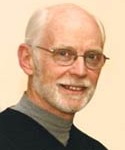I transferred to Princeton as a graduate student in 1975 with the express purpose of studying the history of mathematics with Mike. I never had a chance to take a course with Mike on this topic, but I was fortunate enough to take a course with him in another of his specialty areas, the history of early modern science and technology. Those were my wander years, and I left Princeton after only a year. But a few years later, and for the next twenty years, Mike was my closest professional colleague, not in either of those areas, but instead in yet a third area in which he was expert – the history of computing.
It was wonderful and terrifying to have Mike as a colleague. Wonderful in the sense that there was someone who was deeply familiar with my subject area, who had extraordinary analytical skills, and who was always generous with his time to read a draft paper or talk through an idea. It was terrifying to see how much further and clearer Mike was able to see.
Although I was never worked at Princeton after my graduate days, I had the fortune of serving on several committees with Mike, and we were often invited to the same conferences – so in recent years, I spent time with him in Jerusalem and a small mountain village outside Grenoble, as well as in more customary American academic settings. Mike was always ready with the gentle question or the telling anecdote that led the group back on track.
I remember quite clearly my last conversation with Mike only a couple of weeks before his death – his excitement about the Model T and the history of car buyers, a conversation on the history of software that we continued where we had left off at a previous meeting, and the latest news of his grandkids. It is still hard to comprehend that Mike won’t be here to lead us.
